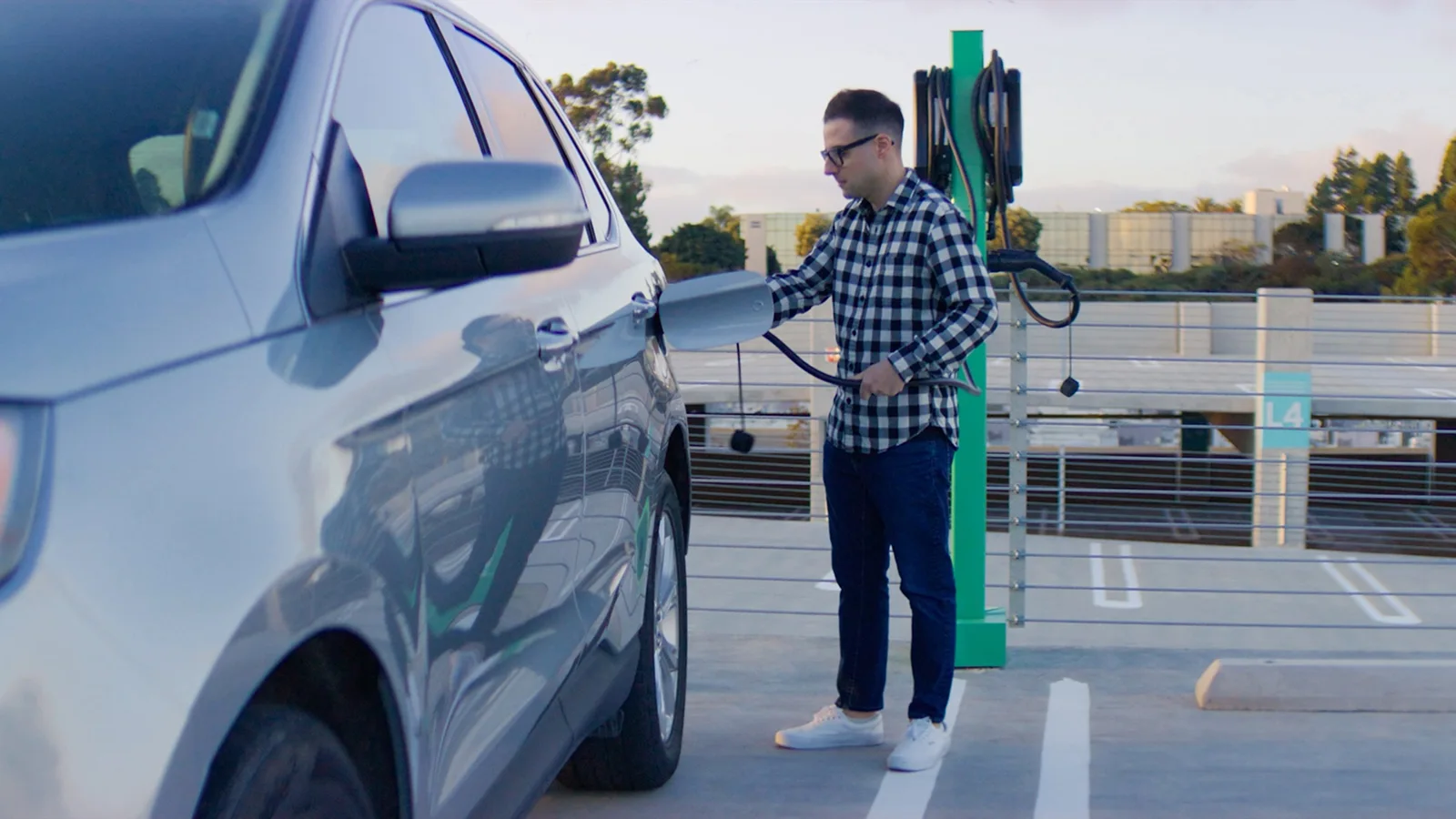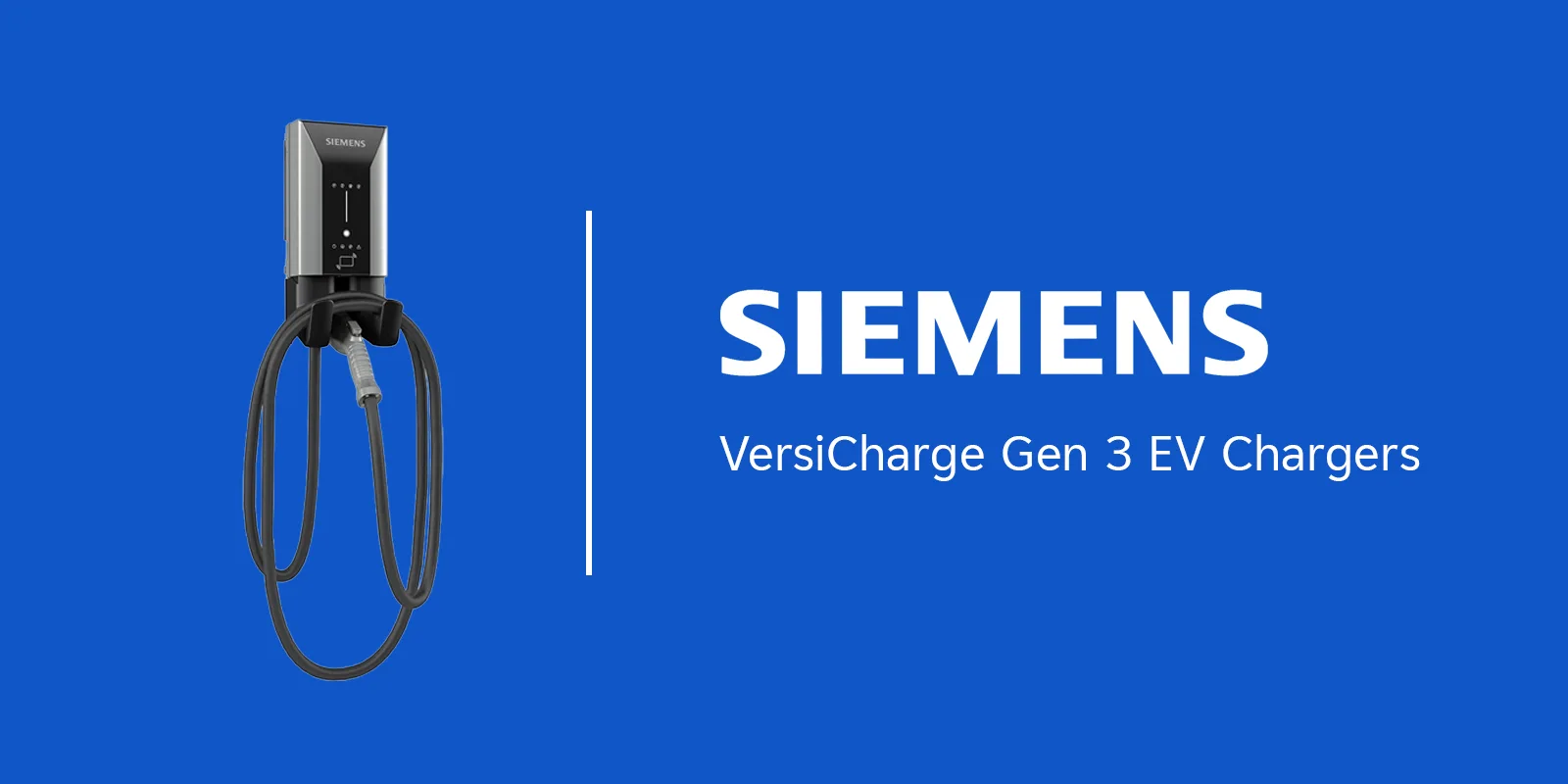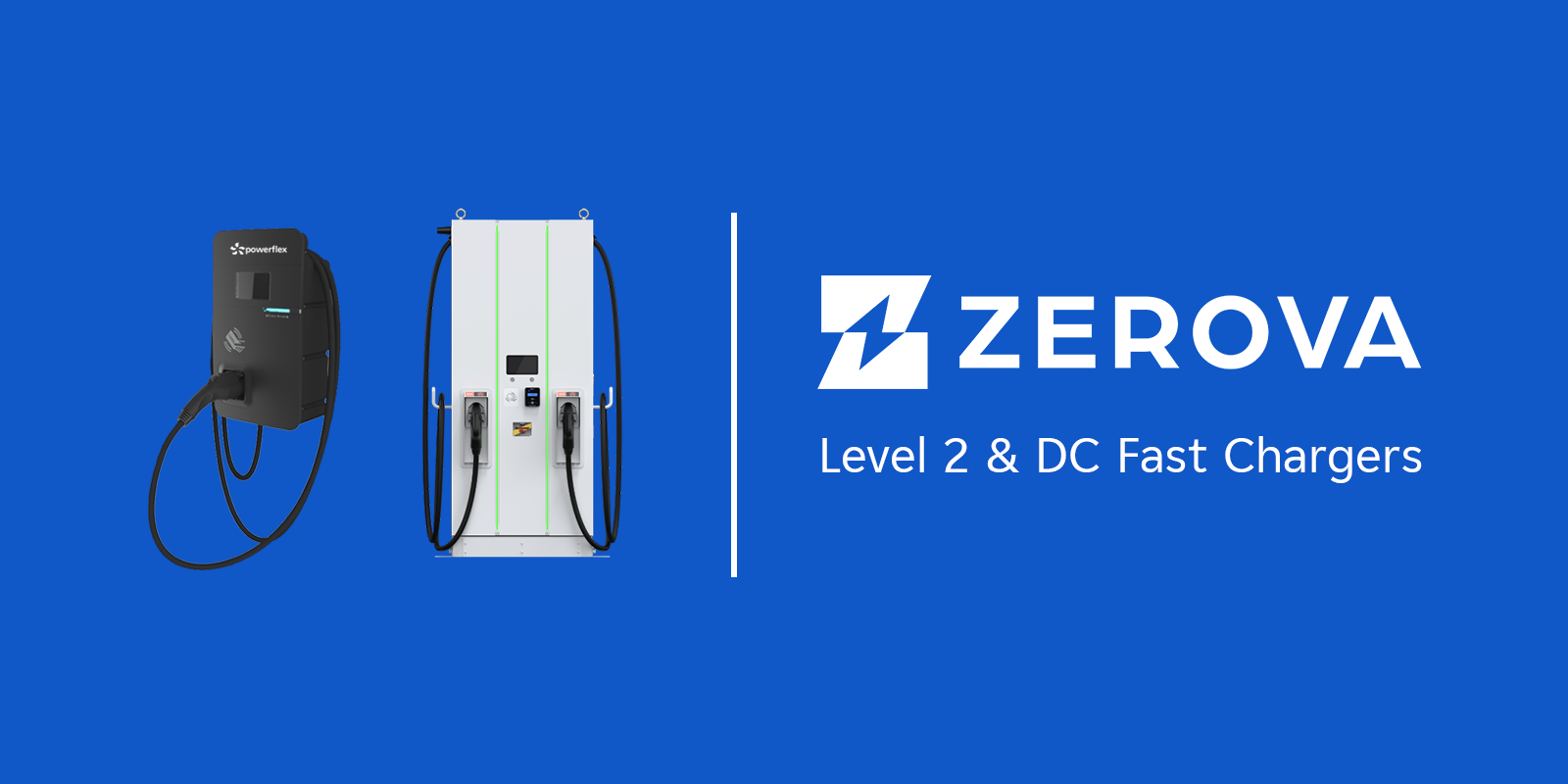Best Commercial EV Charging Stations

As electric vehicles (EVs) continue to pull more market share from gas-powered cars, it promises to reshape the relationship we have with our vehicles. When someone takes ownership of their first fully electric car, refueling goes from a weekly or biweekly afterthought to a daily consideration. Gone are the trips to the gas station, replaced by frequent top-ups that must fit into the daily routine.
Businesses that cater to these changing behaviors will position themselves for success in this new era of vehicle ownership. By providing commercial EV chargers for your customers and tenants, you invite a new generation of drivers to put your business on the map as a charging pit stop.
There’s a litany of items for you to consider when embarking on this new investment, not the least of which is the type of chargers you’ll install. Should you choose AC or DC? Level 2 or Level 3? How much power do you need? In this post, we’ll explore these questions and look at some of the best commercial electric vehicle charging stations available today.
Factors to Consider When Choosing a Commercial EV Charger
When choosing from among the top electric vehicle charging stations, there are numerous factors to weigh. These include:
- Charging type: You can choose between slower but less expensive Level 2 AC chargers and pricier but speedier Level 3 DC Fast Chargers (DCFC). Besides price, it comes down to balancing power consumption with charging speed.
- Charging connectors: EVs utilize a variety of connection types for plugging in, including J-plug, CCS, and CHAdeMO connectors. The best commercial EV charging stations are set up to accommodate multiple connectors so no users are turned away.
- Voltage/electrical upgrade requirements: Level 2 and Level 3 chargers demand different voltage levels, ranging from 208 volts up to 1,000 volts. Your charger choice will be constrained by the amount of power you have available.
- Power output and charging speed: Charger output directly correlates with charging speed, so the higher the output, the faster your customers can recharge.
- Internet connectivity and software integration: EV chargers may come Wi-Fi ready or set up for wired internet connections. The latter requires additional cabling, which will increase installation costs. Additionally, some chargers integrate more readily with specific charging management software, so you should choose your software before selecting chargers to ensure a proper match.
- Payment options: EV charging station companies may equip their stations with a variety of payment options, including near-field communication (NFC), mobile app connectivity, text-to-pay, or simple credit card readers.
- Physical dimensions of the charger: Chargers vary significantly in size, with some being wall-mountable and others requiring a larger, dedicated ground footprint.
How to Choose the Right Charger for Your Needs
As you just saw, the list of factors affecting your choice of EV chargers is substantial, and many involve technical details that company stakeholders may find intimidating. Ultimately, though, the decision comes down to three simple considerations: driver needs, available power, and the vehicles involved.
1. Your Drivers’ Needs
How many customers or tenants do you have, and how will they use your chargers? If they make short visits of an hour or less, a few DCFCs may be a better choice than many Level 2 chargers, which are suited to longer stays. You’ll also want to consider how many drivers are likely to need a charge at a given time — not only now but 10 years down the road.
2. Your Available Power
The amount of power you have at your disposal on site will dictate the number of chargers you can install (though there are ways to ensure that power gets shared efficiently among drivers, which we’ll explore later). If your power capacity is limited, it may be wise to opt for less demanding Level 2 chargers or a smaller number of DCFCs.
3. The Type of Vehicles Involved
Of course, the type of cars you’ll charge is another significant consideration when choosing the best commercial EV charging stations. For example, fleet vehicles and passenger vehicles are vastly different in battery size, not to mention charging speed and energy requirements. Understanding the nature of the vehicles you plan to host on your site is an important piece of the puzzle as you plan your installation.
(Related: How to plan your EV Charging Station Design.)
Best Commercial EV Charging Stations and the Needs They Satisfy
Even with many of the above questions answered, there are myriad options for EV charging stations and equipment available today. How do you sift through them all and select the right one for your situation? Here are our top five recommendations.
PowerFlex JT48 Level 2 Charger

This is PowerFlex’s proprietary charger, and it’s our go-to for Level 2 charging. Fully Wi-Fi enabled and Energy Star-rated, the JT48 comes with a three-year warranty. This 48-amp charger with an SAE J1772 type 1 connector can offer roughly 125 miles of charge for a standard passenger vehicle in just over three hours. It’s fully compliant with Open Charge Point Protocol (OCPP) 1.6 and can be upgraded to OCPP 2.0. Payments can be made via the PowerFlex Kiosk or PowerFlex mobile app.
The JT48’s seamless integration with PowerFlex software, low price point, and limited power demands make this ideal for customers who want to provide plenty of charge points for customers, guests, or tenants with extended stays.
ABB WallBox 24 DC Fast Charger

Among our partner EV charger companies, ABB is our top choice for its feature set and service experience. This trusted partner offers more than just hardware — though its equipment is exceptional. You’ll also get access to industry-leading warranties, web tools, and product lifecycle management. ABB offers a complete EV charging support experience, placing it firmly among the top EV charging companies. Plus, its products are all made in the USA.
The company offers a range of excellent Level 3 chargers, all of which are OCPP 1.6 and ISO 15118 compliant and hardwired for direct internet connections, ensuring more consistent, reliable uptime for credit card payment and communications. The ABB WallBox 24 in particular is an excellent choice for a small, wall-mounted footprint and maximum speed for a Level 2 charger. It comes equipped with an SAE J1772 type 1 charging interface and 100 amps of charging power for roughly 300 miles of charge on a passenger car in under four hours. This is our top recommendation for customers who can spend a little more to invest in faster Level 2 charging.
ABB Terra 124 & 184 DC Fast Charger

ABB also offers our two favorite Level 3 chargers. Both DCFC models require a larger, dedicated floor space and are fully compliant with OCPP 1.6 and ISO 15118. A second charging port can be added to each station to expand simultaneous charging capacity.
The Terra 124 represents a substantial boost in charging power over Level 2 models, offering 120 kilowatts (kW) for an 80% charge on passenger vehicles in less than 45 minutes. Equipped with CCS cable connectors, direct internet connectivity, and credit card readiness, this is an excellent choice for fleets as well as commercial properties or businesses that need to offer a few fast-charging ports for clientele who don’t stay for long periods.
The Terra 184 is ABB’s workhorse model, offering at least 80% of charge for many truck models in less than 45 minutes (note that truck battery range per kilowatt—hour varies significantly by model and size). This is the go-to option for large fleets that need quick charging turnaround to get back on the road. Like the ABB 124, it’s equipped with a CCS connector, is wired for direct internet connectivity, and is credit card-ready.
Delta City 100 DC Fast Charger

Delta City is another top EV charging station company we’re proud to partner with, and it offers more affordable Level 3 chargers without all the bells and whistles you get with ABB. The Delta City 100 is equipped for direct internet connection, is fully compliant with OCCP 1.6 and ISO 15188, and accepts credit card payments. It also includes an optional second port and is upgradeable to OCPP 2.0 compliance.
The Delta City 100 is not quite as efficient as ABB models, requiring more input voltage to deliver less charging power (up to 100 kW from 380–415 volts). But it’s still impressive, offering about 80% charge for a passenger vehicle in under an hour. With a built-in CCS connector, it’s a great choice for smaller fleets or commercial operations that want to offer a few fast-charging stations.
(Related: Benefits of EV Charging Stations for Business)
Let PowerFlex Help You Choose the Right EV Charging Stations for Your Business
Even with this breakdown, there’s a lot to digest when deciding on the best commercial EV charging station for your needs. Thankfully, you don’t have to sort through the options on your own. PowerFlex offers a full-service planning and management solution for commercial EV charging installations. Our experts will conduct a full site assessment to review your power capacity, layout considerations, customer needs, and more. We can help you choose exactly the right charger to fit your budget and customer or tenant profile.
Regardless of which of our recommended models you choose, each one comes optimized with PowerFlex X™, our adaptive energy management platform that co-optimizes EV charging with your facility load. It can even coordinate energy flow across other onsite energy assets like solar arrays and battery energy storage. Our platform optimizes EV charging demand through patented Adaptive Load Management® algorithms, helping you avoid peak use fees from utilities and saving you up to 60% on implementation costs.
Ready to get started? Get in touch with PowerFlex now to start your commercial EV charging project.




